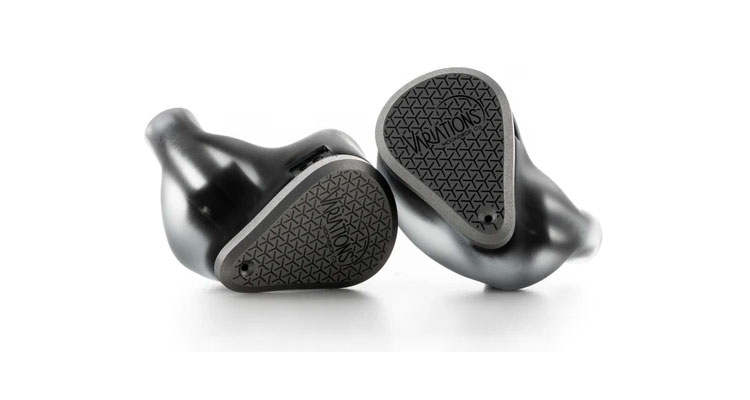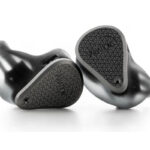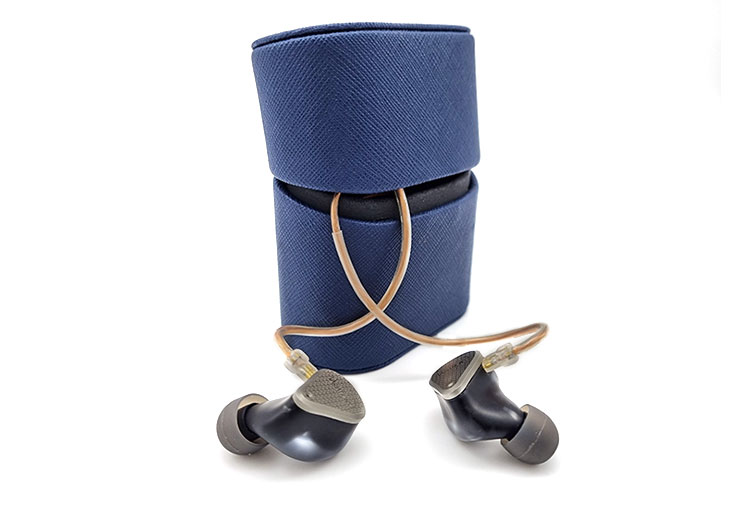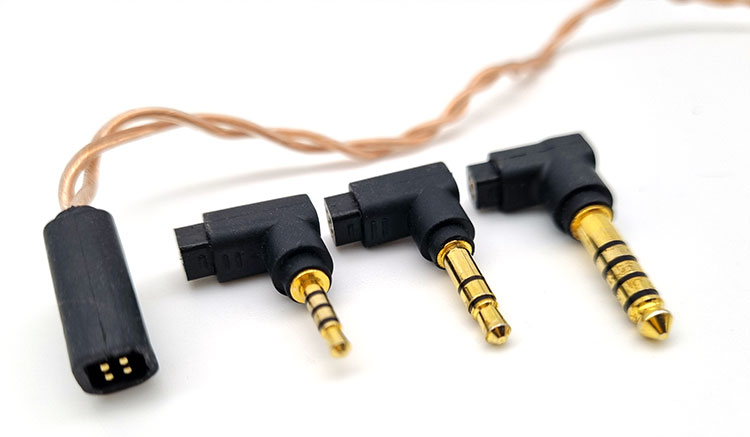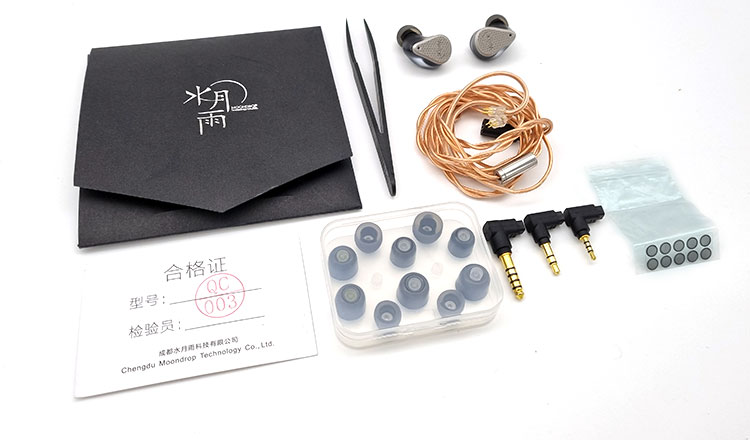Moondrop Variations is a tribrid five driver configuration IEM featuring a single dynamic driver, dual BA, and 2 electrostatic drivers. It is priced at $520.
Disclaimer: The Moondrop Variations sent to us is a sample in exchange for our honest opinion in this review. We thank the team at Moondrop and Shenzhen Audio for giving us this opportunity.
To read more about Moondrop products we have previously reviewed on Headfonics, click here.
Note, this review follows our new scoring guidelines for 2021 which you can read up on here.
In the past year or so, Moondrop has transformed itself into a prolific name in the portable audio industry. Unlike its competitors, Moondrop has remained dedicated to targeting a spectrum of price points within the IEM segment.
From their soon-to-be cult hit Aria (at $100) to the opulent Solis ($1099.99), there’s something for everyone. If you’re wary about spending too much money, Moondrop has got you covered. If money is no object, Moondrop has also got you covered!
However, one of Moondrop’s best offerings is their prodigious Blessing 2 IEM, featuring 4 balanced armatures and a single dynamic driver. Unsurprisingly, its wildly successful releases prompted Moondrop to offer modified alternatives in a bid to capture lightning in a bottle.
Third time’s the charm, with Moondrop’s latest release of the Variations; an IEM that is loosely inspired by the Blessing 2, albeit with new internals under the hood; call it a variation on a theme.
Tech Highlights
The Moondrop Variations houses a tri-brid array of drivers; a 10mm Liquid Crystal Polymer (LCP) dynamic driver, dual Sonion electrostatic tweeters (EST), and Softears customized dual mid-range balanced armatures.
Each driver carries its novel sonic properties, albeit with several imbued flaws. In theory, the harmonious interplay between competing transducer technologies compensates for those noticeable gaps.
Firstly, LCP drivers are commonly found in Sony’s portfolio of hi-res audio products, such as the MDR-Z1R. Dynamic drivers displace a high volume of air, producing deep-bass and natural frequencies. However, dynamic drivers lack the tactility or deftness in both attack and decay.
On the other hand, dual Sonion EST drivers capture the incisive and ringing tonality that treble characterizes. Unfortunately, its aggressive presentation can accentuate unnatural, odd-harmonic frequencies.
Lastly, the dual mid-range balanced armatures offer an excellent middle-ground, producing clean and precise mid-range transients with exemplary performance, albeit with a lack of a low-end body. Integrate them, and you have the Variations; a smart attempt to produce a cohesive sound signature that captures the best of three worlds.
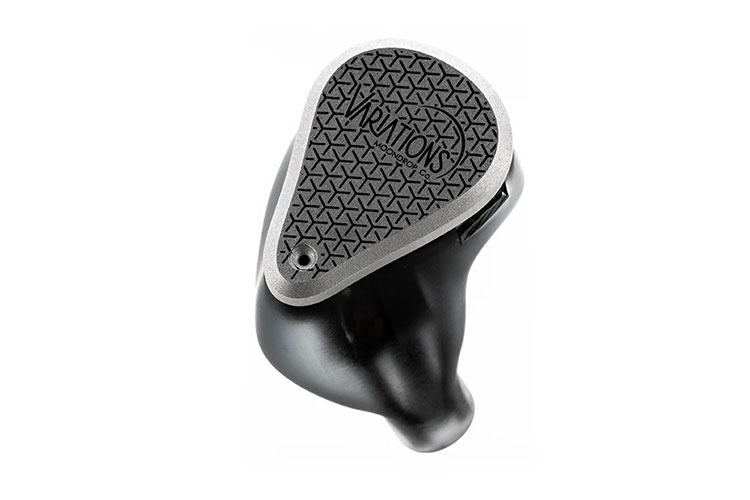
Design
Aesthetics:
The Variations’ chassis is made of 3D printed, medical-grade resin, with a sand-blasted stainless panel with sashiko-like stitching patterns, etched into it.
While it doesn’t deviate too far from the traditional blueprint of acrylic-shelled IEMs, it is a tasteful reinterpretation of it that feels well-built, sturdy, and novel enough to distinguish itself from the rest of the competition. Subjectively, the plainer colorway that Moondrop opted for aligns nicely with my conservative preferences. Your mileage may vary.
Form Factor:
The Variations are slightly larger in comparison to other traditional, acrylic shelled IEMs. Moreover, its nozzle length is reasonably long. There is a reasonable amount of space between the placement of silicon tips, and the shaft of each nozzle.
With this IEM, Moondrop has opted for standard 2-pin connectors. The entire resin shell had no visual or noticeable imperfections. The application of epoxy between the steel faceplates and the resin body was seamless, with no excess glue bleeding out from it.
Comfort & Isolation
The Variations’ light chassis while larger than most IEMs, sit comfortably in my ears without sticking out like a sore thumb. The placement of the 2-pin connectors allows the over-the-ear cables to conform nicely to the contours of your outer earlobe.
After rigorous testing, the Variations never felt uncomfortable after lengthy listening sessions of more than 5 hours. Additionally, purposeful headshaking had failed to dislodge the placement of the IEMs in my ears.
Isolation-wise, the IEMs provided excellent isolation in optimal, silent environments. In windier conditions with high levels of external ambient noise, the Variations provide above-adequate isolation.
It is worth noting that on each shell, there is a pin-hole-sized vent situated at the front edge of each faceplate. Unfortunately, there is a tendency for wind noise to enter the shell, should you be speed-walking in uncomplimentary conditions.
Tips
During the review process, I opted for the standard Silicon tips (M) as provided in the package. Comfort-wise, there were no glaring issues or awkward protrusions. Overall, the fit was snug, with little to no gaps for external noise to filter through.
Stock Cable
The Variations comes packaged with a 6N OCC Copper cable with a single braid for each channel. One notable inclusion is a detachable termination that accommodates both balanced and unbalanced connections via a 4-pin interface.
Swapping the included 4.4mm, 2.5mm, and 3.5mm connectors is incredibly easy; if the connector aligns with the horizontal notch on the receiving end of the cable, you’re all set.
The heat-shrink, memory wire is relatively supple, gently conforming to one’s ears. Additionally, the cable comes with a highly polished, stainless-steel splitter with the “Moondrop” logo in mandarin embossed on it.
Aesthetically, I’m concerned with the cable oxidizing after prolonged usage. Nevertheless, is a problem for the future. Overall, the included stock able is highly adaptable to the most popular, termination formats in the audiophile world.
Packaging & Accessories
Moondrop’s standard package can be characterized as very anime-centric. A brand that doesn’t shy away from its Japanese inspirations, and the Variations is no such exception to that cardinal rule.
The Variations comes decked out in an outer sleeve, adorned with an original anime character printed on the top of the box. Underneath the hood, you’ll first be greeted by the Variation IEMs themselves on the top lid. Remove it, and you’ll find an instruction manual, changeable filters, pliers (for removing said filters), and a safiano-leather style case in navy blue.
Lastly, the Variations’ stock cable and its respective balanced and non-balanced connectors can be found nicely coiled up in the included case.
Sound Impressions
Summary
This is a distilled summary of how the Variations’ sound: It has a strikingly focused, mid-range, punctuated by deep, mid-bass punches.
Bass-wise, the LCP driver within the Variations’ tri-brid away runs deep into the sub-bass registers without overwhelming the entire sound signature. It offers a well-rounded finish without bleeding into its midrange, nor does it decay rapidly. Essentially, Moondrop has taken a neutral approach to tune the Variations’ dynamic driver, without being too conservative nor too liberal.
The Variation’s mid-range is its most prominent feature, with an accurate presentation that promotes clarity, speed, and cleanliness. Even on listening sessions where your attention is diverted elsewhere, the Variation’s manages to provide above-adequate amounts of detail. Think Etymotic’s house sound, minus its trenchant treble, and add a rotund bass response.
Its rich, center-rich image allows for clinical separation without that “artificial” separated frequency response (FR) that’s characteristic of balanced armatures. The Variations’ treble is both porous and airy, with a bell-like timbre; a by-product of Sonion’s reputable EST drivers.
The Variations’ highs are present and accounted for. But it takes a back seat in the FR, with its signature mid-range and robust low-end steering the ship.
What is interesting, however, is the harmonious interplay between the three driver types. Each respective driver has its novel quirks, and it isn’t all that difficult to pick apart its contributions in the resulting sound.
Timbre
The Moondrop Variations’ mid-range prominence allows fundamental, harmonic tones to present themselves concisely in the FR. Neither adding or subtracting, it avoids changing the core tonalities of the instruments, or the vocals it is presenting.
However, by virtue of its mid-forwardness, the high and low-end both take a backseat in the entire mix. Since human physiology dictates that the midrange is the “body” of the FR that is the most audible to our ears reflects Moondrop’s intelligent approach to tuning and timbre.
Acoustic instruments are warm, loosely associated with a “cabin-like” ambiance, and gentle even-harmonic notes with lengthier sustain. On the Variations (ironically), there seems to be little to no variation on how these instruments present themselves in the entire mix.
The final output never sounds overly austere in its presentation, nor does it sound too cloyingly sweet/warm. Moreover, the Variations’ low-end has a propensity for mid-bass forwardness; it provides a needed layer of excitement, especially with electronic tracks juxtaposed by unashamedly punchy kick drums.
On the other hand, jazz instrumentation, especially brass sections, or piano, are well-presented. The fundamental, shrill tones of the baritone saxophone and the taut decay that characterizes jazz piano are captured with finesse. However, their over-excitable nature is blunted by a tastefully rolled-off treble that helps to dissipate any harsh sibilance.
Sadly, this is also a noticeable con. The lack of sizzle in the upper midrange to highs makes the Variations slightly dull, especially on jazz tracks where slight dissonance is necessary.
Perhaps Moondrop has overplayed the safe card here, where any semblance of harshness is eliminated. Not all instruments are created equally. Therefore, odd-harmonic instruments do not sound as timbrally accurate as their even-harmonic counterparts.
Staging & Dynamics
The Variations display a reasonably large lateral width that is expected of an IEM at this given price range. Voices and instrumentation are given ample L-R headroom to breathe and expand; it isn’t a narrow, and claustrophobic centered-image.
However, this is reminiscent of most IEMs, regardless of their price. What separates the best from the worst, is their imaging prowess, and this is one of the Variations’ strongest suits.
The Variations’ strict emphasis on the mid-range allows listeners to pick apart the placement of each instrument, and vocal cue across a stage with a wide circumference, with the listener situated in the middle of it.
Even songs with an onslaught of instruments between both channels are legible, with each layer easily identified with little to no effort. Therefore, the Variations’ stellar imaging compensates for its satisfactory soundstage.
Thankfully, the Variations’ successes don’t stop there. The Variations’ dynamics capture the hallmarks that each respective transducer carries, their positive properties working harmoniously as a single, piston-like driver.
The mid-range is spontaneously responsive to sudden changes in amplitude, representing these alternations in kind. Juxtaposed by a slightly slower, albeit realistic representation of what a kickdrum should sound like. Piano-strikes are incisive, clean, and concise.
The diffuse nature of the treble region is also reflected brilliantly by the included Sonion EST drivers. However, the EST drivers adopt a modest tuning that tries to tug back on the abrasiveness of past EST implementations in IEMs. Moondrop doesn’t reinvent the wheel here, but it expresses that old wheel remarkably well.
Click on page 2 below for pairings and select comparisons

